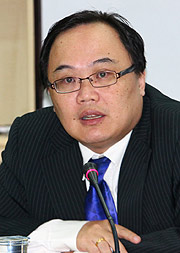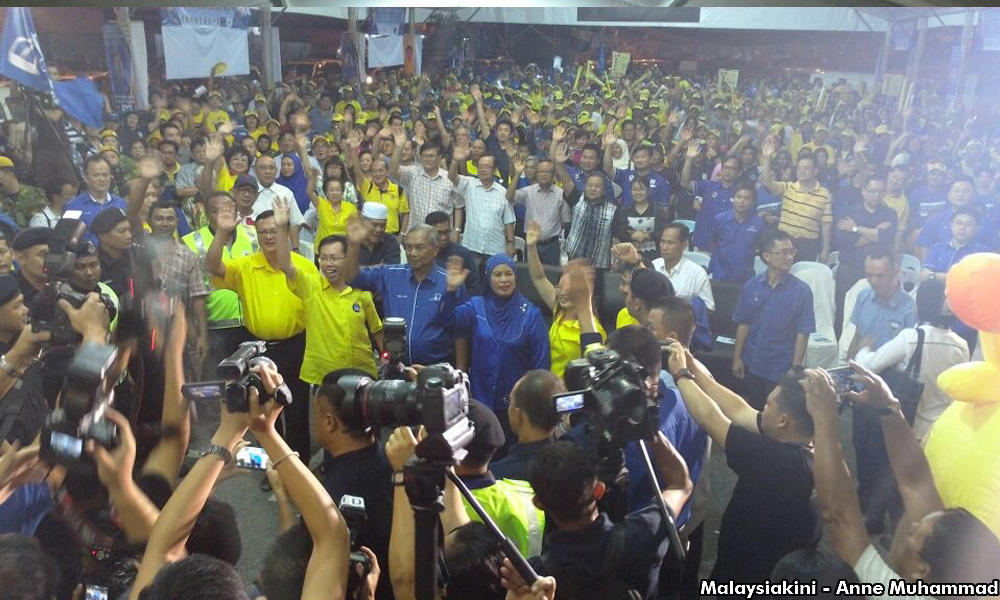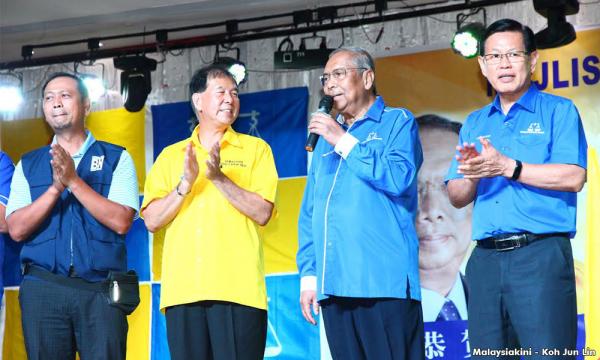ANALYSIS Sarawak BN chief and Chief Minister Adenan Satem is on the road to a victory in the 11th Sarawak state election this year, pushing the right buttons right from the start since the day he took office in 2014.
Even before Adenan called the elections, University of Tasmania’s Asia Institute director James Chin maintained his early predictions since last year.
“I’m very confident that Adenan will win by at least a two-thirds majority.The reason is rather simple, as you know and the readers, too, they have added 11 new seats the Sarawak election this time,” he said.
He felt that it is almost possible for BN to win 10 out of the 11 newly-redelineated seats contested, along with the strong 40 seats from the main party of the Sarawak BN coalition, Parti Pesaka Bumiputera Bersatu (PBB).
 Asked to comment on Adenan’s move to ban the entry into Sarawak of opposition figures from Peninsular Malaysia, Chin (photo) sees this as Adenan being quite clever, based on three major strategies.
Asked to comment on Adenan’s move to ban the entry into Sarawak of opposition figures from Peninsular Malaysia, Chin (photo) sees this as Adenan being quite clever, based on three major strategies.
“First, obviously, is the move of ‘hijacking’ the ‘Sarawak for Sarawakians’ movement. By saying that, you know, if you vote for Adenan, only he will restore all the rights Sarawak lost in the Malaysia Agreement 1963,” Chin said.
The idea of voting solely for BN is akin to voting to give Adenan a strong mandate that will enable him to negotiate further with the federal government, he explained.
The move to ban opposition political figures from entering Sarawak has successfully turned the major 1MDB issue, which has been the key propaganda by the Pakatan Harapan, to become a non-issue in the state.
“The third thing he did was to get rid of the entire BN theme, by declaring that there are no more parties in Sarawak BN, but it is all about Team Adenan,” he added.
The entire BN machinery was banking on the popular image of Adenan, which Chin compared to a presidential-type of campaign that is conducted in a place like the United States.
“They group the whole campaign around one person, that’s the reason why Adenan said that even if the voters don’t like the candidate, the voters have to assume that they are actually voting for Adenan,” he explained.
Team Adenan vs Barisan Najib?
It was like this as well in the last general election in 2013, when the whole BN campaign was centred on Prime Minister Najib Abdul Razak as the key player in the campaign strategy.
However, the Najib-led BN lost the two-thirds majority again in the parliamentary elections, marking it as the worst performance for the ruling coalition.
 In Sarawak, it may look like a similar strategy employed by the state ruling coalition to throw their bets behind their state BN leader Adenan. However, Chin opined that both strategies cannot be compared equally.
In Sarawak, it may look like a similar strategy employed by the state ruling coalition to throw their bets behind their state BN leader Adenan. However, Chin opined that both strategies cannot be compared equally.
“You can’t really compare the politics in the peninsula and in Sarawak. On the surface it looks like it has a lot of commonalities in terms of campaigns and politics, but these are really superficial.
“If you scratch below the surface, you will see that they are very different. The best way of describing is that Sarawak politics still require a very personal touch and issues are still very parochial,” he said.
One of the key reasons why the BN is able to get away easily is because Sarawak is the only state in Malaysia that holds its state elections separately from the general election.
Therefore, Chin said, if Najib does not become the issue during the state elections, he may become an issue during the parliamentary elections later in 2018.
‘Cold’ turnout during campaigns
With less than a week to go before the polling day on May 7, the turnouts at political campaigns received acklustre support from local voters, even in the urban areas.
Although some supporters may come in throngs during political campaigns, their numbers are much less if compared with the previous state election in 2011, or with the last parliamentary election in 2013.
For Chin, the numbers are down primarily due to the unresolved seat tussle between DAP and PKR that has affected the turnout in the urban areas during this election.
He noted that the absence of the ‘big names’ of the opposition figures from Peninsular Malaysia due to their being banned entry into Sarawak, people feel that there is no point to attend their campaigns.
“What the opposition has done is to bypass all that by using the Skype link (with their banned leaders) during the ceramah sessions, but obviously that doesn’t work because the urban voters from Sarawak prefer to see the opposition figures in the flesh,” Chin said.
The ‘broken’ Pakatan Harapan in Sarawak
Pakatan Rakyat in Sarawak was disbanded after the announcement by the state DAP chairperson Chong Chieng Jen in 2015 following the spat between the two key opposition leaders from DAP and PAS.
Sarawak PKR is led by the incumbent Ba’kelalan assemblyperson Baru Bian.
 On Sarawak DAP-PKR, it is all about the ongoing bad relationship between the two leaders and ways to reconfigure the political voting pattern in Sarawak.
On Sarawak DAP-PKR, it is all about the ongoing bad relationship between the two leaders and ways to reconfigure the political voting pattern in Sarawak.
However in Peninsular Malaysia, the voting pattern is rather simple and it is basically divided into three major areas - urban, semi-urban and rural areas.
But in Sarawak, Chin said, it is a “funny” situation, where most of the urban areas with majority Chinese seats have already been maxed out by the DAP. Therefore they can only expand to the Dayak non-Muslim bumiputera areas in Sarawak.
“The problem is that once DAP moves in, they will hit a brick wall because that is the natural catchment point for PKR, that is the area where PKR is the strongest,” he added.
With that, DAP is trying to move into the Dayak areas where PKR has a strong foothold.
Due to the lack of their machinery, Chin pointed out that DAP is much more sophisticated with large campaigns and using technology to complement their campaign strategies.
However, PKR remains with the basic type of machinery, by setting up a stage for the campaigns and giving out flyers, with no follow-up.
Chin further said that the DAP machinery has been on the ground for the last two years with the Impian Sarawak programme. The DAP is also much more systematic, compared with PKR, and it has a full-time machinery on the ground.
The national leadership from the opposition pact would usually step in and sort out the controversial seats, even during the elections in 2011 and 2013.
Chin feels it is unusual that this time, despite the involvement from the federal leaders in the seat negotiations, the agreement did not hold at the end of the day.
“So I think that is quite surprising, because it is now a free-for-all in the opposition.
“This means that in the next general election for the whole of Peninsular Malaysia, Sabah and Sarawak, this means opposition leaders in every state will say that if the leaders in Sarawak can do it, why can’t we?” he added.
Will the voters punish DAP-PKR?
The ongoing tussle of seats between DAP and PKR has caused much uncertainty on the outcome of this election for the opposition pact.
The two parties are clashing in five seats - Mulu, Murum, Simanggang, Ngemah and Mambong. With this, DAP has retaliated by contesting in a sixth seat, Batu Kitang.
Chin, who is also a local Sarawakian, thinks that it is difficult to predict the outcome at the moment.
He suspects that the ‘peculiar’ cold behaviour by the voters during the electoral campaign may be an indicator that they have decided on their votes and with that, either the opposition will do very well or they will face the backlash from the voters.
“If they do very well, the combined seats for the opposition will be slightly above 20 seats, and if they do very badly, they will end up with about 10 to 15 seats,” Chin said.
The opposition may possibly maintain the status quo of the number of seats because it is really difficult for BN to win back some of the urban seats that were won with large majority votes in the last state election.
Despite all that, Chin noted that BN has an in-built advantage from the last redelineation exercise that has shifted some voters around, and that it also has a large number postal votes from the mebers of the police and armed forces.
Tomorrow: Part 2 - Sarawak elections not a barometer of Najib’s popularity
NORMAN GOH is a member of the Malaysiakini Team.


